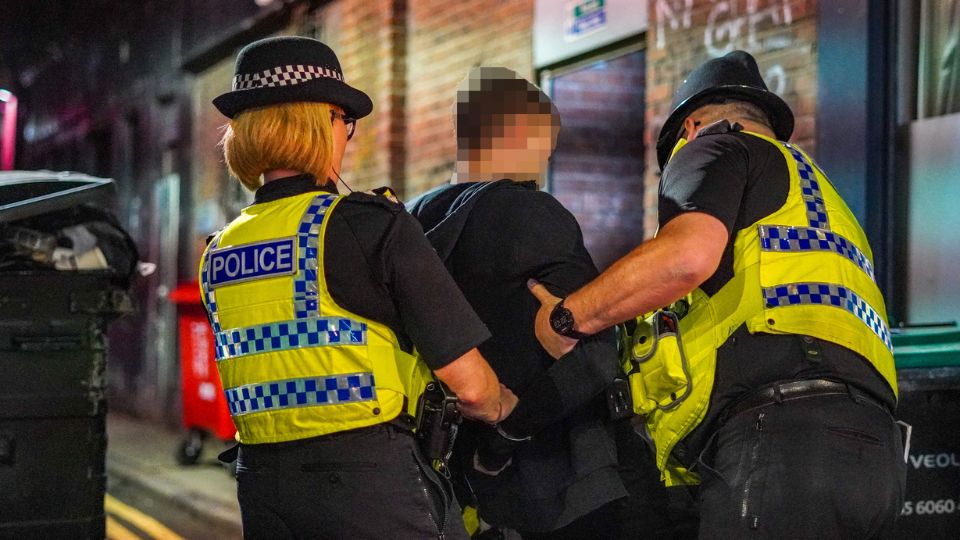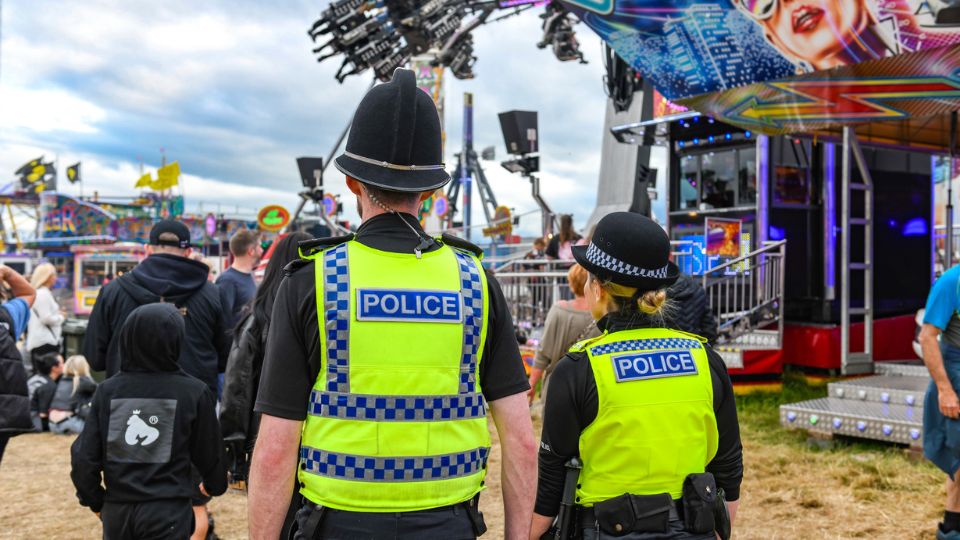POLICE OFFICER ELIGIBILITY
Whilst we welcome applications from people of all backgrounds, there are some police officer eligibility conditions that all applicants need to meet. Before you start your application, please ensure you meet our police officer eligibility and entry route requirements.
Are you eligible?
To join as a Police Officer with Northumbria Police:
Applicants for the Police Constable degree apprenticeship must have:
- Level 2 qualifications in both English and Maths for example a GCSE or iGCSE at grade C (level 4) or above, Functional Skills Level 2, Key Skills Level 2 (Communication and / or Literacy) or Adult Numeracy / Literacy PlusAND
- Level 3 qualifications where the grades total 112 UCAS points or higher. Your Tariff Points can be made up of a number of different types of qualifications. Please utilise the UCAS calculation tool to help you. Please utilise the UCAS calculation tool to help you.
OR
- Be aged 21+ and have a minimum of 2 Level 3 (or higher) qualifications. PLUS a minimum of 3 years work experience that will support your progression into the Police Officer role. We will review work experience in line with our core force values and the National Police Officers competency and values framework.
Applicants for the Degree Holder entry programme and Graduate Detective programme must:
- Be a level 6 degree (or higher, i.e. master’s degree/ PhD, etc.) holder in any subject area or be a student within the final year of study for a degree.
AND
- Hold level 2 qualifications in both English and Maths. For example a GCSE or iGCSE at grade C (level 4) or above, Functional Skills Level 2, Key Skills Level 2 (Communication and / or Literacy) or Adult Numeracy / Literacy Plus
Applicants for the Police Constable Entry Programme must have:
- Level 2 qualifications in both English and Maths for example a GCSE or iGCSE at grade C (level 4) or above, Functional Skills Level 2, Key Skills Level 2 (Communication and / or Literacy) or Adult Numeracy / Literacy Plus
AND
OR
- Hold a degree in Professional Policing Practice from a College of Policing accredited supplier or be in your final year of study. If you have a Professional Policing Degree you will automatically be enrolled onto our PCEP entry route.
- If you don’t have A-Levels but do have at least one year of professional experience working in areas such as those below, we encourage you to apply: (note that this is not an exhaustive list and all previous experience will be assessed on a case-by-case basis.) armed forces, border force, criminal justice sector/CPS/courts, cyber/digital and financial fraud crimes, emergency services, health and social care sectors, justice and law enforcement sectors, police staff (particularly custody, public contact/demand hub/enquiry office roles and investigative roles), PCSO or Special Constable, prison service, professional services/project management, teaching, youth work.
When completing your application, it’s important that you attach proof of your qualifications. Your application will not be accepted without a copy of your certificates unless you are within your final year of study.
If you have specific questions about the entry requirements, or your qualifications/experience please get in touch with our Talent Acquisition team.
It’s important you are aware that at the point of recruitment you will go through a thorough health screening and medical assessment. This can result in an unsuccessful application due to previous or ongoing health conditions that may create an unacceptable risk in the role. Support is in place to help our police officers; however, the recruitment standard is set to protect yourself, our officers, and members of the public and to optimise successful recruitment of long-term police officers into the force.
We cannot assess your medical history prior to a conditional offer of employment. Please ensure you read through the Home Office Medical Standards and Annexes A & B to understand if your medical history or any current conditions may have an impact on your eligibility for the role. Those documents set out the current best medical advice in relation to medical fitness to be appointed as a police officer. Whilst each application will be reviewed on a case-by-case basis, it is likely that your application may not be successful if you apply when, for example, still on mental health treatment, have had a recent major operation or have recently had an epileptic seizure.
As part of our medical checks, you will also be expected to pass a BMI analysis with 18-30 as recruitment standard. Getting to the expected level of health and fitness can be very different depending on each person – we’re all unique! – but can be achieved with some determination, practice, and support.
You must meet a national police eyesight standard. You are permitted to wear contact lenses or spectacles to meet the standard.
Misuse of substances contradicts everything the police stands for. If you are currently using any illegal drugs, this will rule you out of the recruitment process automatically.
You will be tested for substance misuse during the recruitment medical process. You may also be subject to substance misuse testing at any stage during your career with us.
The fitness test allows an assessment to be made of your endurance to ensure you are able to meet the demands of operational policing.
The test focuses upon aerobic capacity. You will carry out a shuttle run over a 15 metre area and run in time with a bleep. At the end of each level the time in between the bleeps is shortened and you therefore have to run faster to keep up with the pace. The recruit pass mark is level 5.4. This involves running for approximately 3 minutes 40 seconds. If you do not think you can achieve this level, you should ensure you start improving your fitness levels as soon as you can. Please check with your doctor before making any big changes to your fitness regime.
Dependent upon your circumstances, it’s unlikely that you will pass our vetting process if you have an existing county court judgment outstanding.
If you have been registered as bankrupt, and your bankruptcy debts have been discharged, you are unlikely to receive clearance until three years after the discharge of the debt. Debt relief orders (DROs) are treated in the same way as a bankruptcy.
If you are the subject of a current Individual Voluntary Arrangement you will be required to provide supporting documentation and proof of regular payments over a number of months.
You can run a free credit report before completing your application to view any defaulted accounts or County Court Judgements that may be resolved or managed before you submit your vetting application.
Each case will be considered on its individual merits.
Circumstances that will prevent you from passing our vetting process include:
- offences were committed as an adult or juvenile which resulted in a prison sentence (including custodial, suspended or deferred sentence and sentences served at a young offenders’ institution or community home).
- the applicant is or has been a registered sex offender or is subject to a registration requirement in respect of any other conviction.
The following circumstances may also result in rejection:
- offences where vulnerable people were targeted.
- offences motivated by hate or discrimination.
- offences of domestic abuse.
You must be aged 17 years or over to apply. If successful in the application process you are not able to start employment until you turn 18 and have the required qualifications.
There is no upper age limit for applying to the police service. However, please bear in mind the normal retirement age for police officers is 60 years and new recruits are required to undertake a probationary period of three years.
You must have been continually resident in the UK for the three-year period immediately before an application is made. This is to satisfy the requirement to vet all applicants in an equitable manner. If you have travelled overseas on a gap year or similar, we consider that to be on an extended holiday and you have therefore maintained residency in the UK (generally considered 12 months or under).
You will need to look smart and clean at all times when representing the Force on any duty. Religious or cultural clothing can be worn, provided it is suitable for the purpose.
Headwear – If you wear a turban or an Imama Shareef a force badge must be on display. Anyone wearing a hijab or skullcap must wear their headwear over it when on foot patrol.
Facial hair – operational officers should not have a long beard, because of health and safety risks; although we can make exceptions for religious reasons.
Jewellery – Religious requirements to wear jewellery are judged on their own merit. They are only allowed if not a significant health and safety risk and unobtrusive.
We have a policy to prevent officers and staff from becoming members of organisations or groups whose aims, objectives or pronouncements may contradict our duty to promote equality (e.g. BNP, Combat 18, National Front etc.). Therefore, if you are a member of a proscribed organisation or other group, you will not be accepted.
- undermine the dignity and authority of the office of constable;
- cause offence to members of the public or colleagues and/or invite provocation
- indicate unacceptable attitudes towards any individual or section of the community
- indicate alignment with a particular group which could give offence to members of the public or colleagues; and
- be considered inflammatory, rude, lewd, crude, racist, sexist, sectarian, homophobic, violent or intimidating
Although tattoos will not prohibit applicants from joining Northumbria Police (subject to the above), it is recommended they are covered when at work to maintain a professional image. The dress and appearance protocol outlines that officers should wear appropriate work wear which covers tattoos as far as possible when at work, which will be issued accordingly.
If your tattoo is determined as not acceptable, your application will not be progressed.
The purpose of this is to ensure business interests and additional occupations do not conflict with the work of the police, undermine public confidence or adversely affect the reputation of the police officer or Northumbria Police. You must also declare
Police Officers, and certain police staff roles, are restricted from taking an active part in political activity, such as stand as a member of parliament/local authority or be an officer of a politically party.
You must have a full UK manual driving licence or such overseas license as is recognised by the UK licensing authorities as permitting the holder to drive manual cars in the UK. But, we do accommodate for applicants who don’t drive due to a disability.
If you are not a British citizen, you must provide proof during the recruitment process that you have no restrictions on your stay in the UK and that you have the right to work in the UK. Information on UK immigration rules can be found on the government visa and immigration website.
Having an inappropriate association does not necessarily mean that you won’t be granted a vetting clearance.
The College of Policing advise us to look for inappropriate comments, behaviour and views on publicly available social media accounts to ensure the applicant’s online behaviour is compatible with the Code of Ethics and Standards of Professional Behaviour. We therefore conduct social media checks on all applicants and consider every social media account, such as Facebook, Instagram, Twitter, Tik Tok, YouTube etc.
Where relevant information is not declared at the vetting stage, the presumption is that the applicant’s honesty and integrity are in question. This may lead to you being refused clearance.
Many people claim they were told by the police officer that dealt with them that there would not be a record of the event. You should presume that everything is recorded and failure to mention it will have an adverse effect on your application.
If you declare something which is not relevant, the Force Vetting Unit will discount it.
Frequently asked questions about our vetting process
What are the most common mistakes when completing vetting applications and how can these be avoided?
- Missing information – take your time and carefully read through the questions and any available guidance.
- Always be honest – if you’re asking yourself whether you need to declare something on your vetting form, include it. The vetting unit will discount any information that is not required.
- If you can’t remember or provide specific details include a rationale detailing why.
- Provide your full address history (including any student accommodation).
- Always provide a full list of family members, including half siblings, stepfamily and the full details of a partner or spouse.
- Including details of boyfriend/girlfriend under the spouse/partner section. We require details of those with whom you are co-residing as partners or those you are married or in a civil partnership with)
- Make sure you provide maiden names, dates of birth and addresses for all the people listed on your vetting forms.
- Declare all previous interactions with the police. All police involvement is recorded on our systems; if you fail to declare it your honesty and integrity could come into question.
- For police staff and volunteer roles, protected cautions and convictions do no have to be disclosed as per the Rehabilitation of Offenders Act 1974 (Exceptions) Order 1975.
- Include details of any criminal associates – this includes friends, family members and those you live with.
It is important that the Force Vetting Unit is made aware of any changes in your personal circumstances both during and after the vetting process. You are responsible for communicating these changes.
You should make the Force Vetting Unit aware of:
- Change of name or address
- Change of co-residents over the age of 10
- Change of partner
- Significant changes in financial status (including a windfall over £9,000, defaulted account, county court judgement or participation in a debt management plan etc.)
- Involvement in legal proceedings of any criminal nature (this includes criminal convictions and cautions and motoring offences including speeding fines)
- Adverse findings in civil matters (including child contact restrictions, non-molestation orders, bankruptcy orders etc.)
- Any convictions or cautions for criminal offences or involvement in criminal investigations relating to anyone included on your original vetting or application forms.
There are many reasons why an applicant can be refused and where possible the applicant will be told the reasons. However there are a number of situations where they cannot be told because the information held may relate to a family member, criminal associate or may be subject of an exemption from disclosure under the Data Protection Act.
Yes. You may appeal a vetting decision where you believe one or more of the following factors apply.
- Further information is available that was not considered by the decision maker.
- The vetting rejection was disproportionate considering the circumstances or details of the case.
- The decision was perverse or unreasonable.
- No explanation was given for the decision.
Any appeal must be in writing and must clearly set out the grounds for appeal. Appeals are dealt with by a senior officer or member of staff who is independent of the original decision-making process and has not been previously involved in the case. Applicants should address their appeal to the Force Vetting Unit in the first instance who will pass the appeal, along with any rationale for the decision, to a senior officer or member of staff who will look into the case and respond directly to the applicant.
Each case is treated on its merits and therefore it depends on what information is found during the checks. Sometimes it is necessary to call the applicant to interview so that their personal circumstances may be discussed and sometimes it is necessary to make enquiries in other forces or with other bodies. Therefore, we do not give a set time to complete a vetting file but deal with them as quickly as possible.
What are the most common mistakes when completing vetting applications and how can these be avoided?
- Missing information – take your time and carefully read through the questions and any available guidance.
- Always be honest – if you’re asking yourself whether you need to declare something on your vetting form, include it. The vetting unit will discount any information that is not required.
- If you can’t remember or provide specific details include a rationale detailing why.
- Provide your full address history (including any student accommodation).
- Always provide a full list of family members, including half siblings, stepfamily and the full details of a partner or spouse.
- Including details of boyfriend/girlfriend under the spouse/partner section. We require details of those with whom you are co-residing as partners or those you are married or in a civil partnership with)
- Make sure you provide maiden names, dates of birth and addresses for all the people listed on your vetting forms.
- Declare all previous interactions with the police. All police involvement is recorded on our systems; if you fail to declare it your honesty and integrity could come into question.
- For police staff and volunteer roles, protected cautions and convictions do no have to be disclosed as per the Rehabilitation of Offenders Act 1974 (Exceptions) Order 1975.
- Include details of any criminal associates – this includes friends, family members and those you live with.
It is important that the Force Vetting Unit is made aware of any changes in your personal circumstances both during and after the vetting process. You are responsible for communicating these changes.
You should make the Force Vetting Unit aware of:
- Change of name or address
- Change of co-residents over the age of 10
- Change of partner
- Significant changes in financial status (including a windfall over £9,000, defaulted account, county court judgement or participation in a debt management plan etc.)
- Involvement in legal proceedings of any criminal nature (this includes criminal convictions and cautions and motoring offences including speeding fines)
- Adverse findings in civil matters (including child contact restrictions, non-molestation orders, bankruptcy orders etc.)
- Any convictions or cautions for criminal offences or involvement in criminal investigations relating to anyone included on your original vetting or application forms.
There are many reasons why an applicant can be refused and where possible the applicant will be told the reasons. However there are a number of situations where they cannot be told because the information held may relate to a family member, criminal associate or may be subject of an exemption from disclosure under the Data Protection Act.
Yes. You may appeal a vetting decision where you believe one or more of the following factors apply.
- Further information is available that was not considered by the decision maker.
- The vetting rejection was disproportionate considering the circumstances or details of the case.
- The decision was perverse or unreasonable.
- No explanation was given for the decision.
Any appeal must be in writing and must clearly set out the grounds for appeal. Appeals are dealt with by a senior officer or member of staff who is independent of the original decision-making process and has not been previously involved in the case. Applicants should address their appeal to the Force Vetting Unit in the first instance who will pass the appeal, along with any rationale for the decision, to a senior officer or member of staff who will look into the case and respond directly to the applicant.
Each case is treated on its merits and therefore it depends on what information is found during the checks. Sometimes it is necessary to call the applicant to interview so that their personal circumstances may be discussed and sometimes it is necessary to make enquiries in other forces or with other bodies. Therefore, we do not give a set time to complete a vetting file but deal with them as quickly as possible.
Ways into policing
Whether you prefer high-adrenaline, fast-paced work or you’re more of an analytical problem solver, there’s a pathway into policing that’s right for you.
999 response officer
An on-the go, ‘no two days the same’ job, where you’ll respond to incidents that need your help.
Neighbourhood officer
Neighbourhood officers are problem solvers, change-makers, and protectors at the heart of a community.
Detective
Our police detectives thrive on the pursuit of justice, meticulously leading complex investigations to achieve the best outcomes for victims.
Take your first steps into policing
Before you apply to become a 999 response officer, detective or neighbourhood officer you’ll need to join a mandatory information event.
Here, you’ll gain insight into what working at Northumbria Police is really like, find out more about the application process and how to prepare for the role, eligibility requirements, police officer pay & benefits, and you’ll have the opportunity to speak to current officers.
Choose your preferred date below to sign up to an upcoming Teams, online event.
Can’t make these sessions? We’ll be running events all year, check back for later dates.



